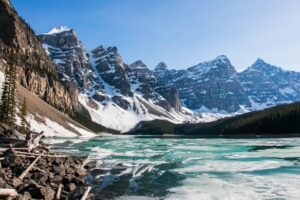Colonial Tensions: Reconciling Intellectual Freedom and Indigenous Knowledge Systems in One Canadian iSchool
Colonial Tensions: Reconciling Intellectual Freedom and Indigenous Knowledge Systems in One Canadian iSchool
Cameron M. Pierson, PhD, MLIS
I acknowledge that I wrote this piece on the traditional, ancestral, and unceded territory of the of the hən̓q̓əmin̓əm̓ speaking xʷməθkʷəy̓əm (Musqueam) people.
When we are told “you can’t know that” or “you can’t have access to that” – what do we think? How do we feel? Annoyed? Curious? Professionally on alert? Alarmed that our intellectual freedom – the right of everyone to seek, impart, and obtain information in any form, regardless of frontiers – may be denied? Most would find such reactions understandable. After all, the information professions have a history and ethos of resisting censorship, seemingly both more important and more fragile in the contemporary climate. However, when returning to these statements with a colonial lens, we understand there is a depth to the cultural meaning many of us may not first gauge. Indigenous knowledge systems, traditional ways of knowing and being of Indigenous, First Nations, and colonised Peoples, can often feature forms of knowledge reserved for certain members within a community according to some characteristic. That is to say, it is not for all to know.
—How do we further the enormous task of truth and reconciliation between the fundamental principle of intellectual freedom with the collective sovereignty due to our First Nations siblings?—
So – how do we further the enormous task of truth and reconciliation between the fundamental principle of intellectual freedom with the collective sovereignty due to our First Nations siblings? This is a recurring question and theme of the course Foundations of Intellectual Freedom in Librarianship at the iSchool of the University of British Columbia. In the winter of 2023, I was tasked with the development of a dedicated course on intellectual freedom. It is currently one of only three such courses in Canada, alongside the University of Alberta and the University of Toronto. I knew from the outset that sober care was needed, not just for the concept of intellectual freedom as a core professional value, but also for its contextual “tension points” – a term I use with students to highlight the often difficult and almost always nuanced, limitations of a principle framed in absolute terms.
 Indigenous Knowledge has long been subject to suppression, if not systematic efforts toward erasure. In Canada, for example, the history of Residential Schools remains an ongoing aspect of reckoning. The legacy of the disruption of Indigenous Knowledge Systems by such efforts has been articulated with the concept of precious fragments, coined by Kimberley Lawson. It is an acute example of how libraries, archives, and museums have not only played a role in the suppression of this knowledge, but also the present and future responsibility toward redress. Precious fragments characterises “information about traditions and history but are separated from the people who created them. Without cultural, historical and juridical context, these fragments are easily misunderstood and misrepresent the knowledge and culture of their originating communities.”
Indigenous Knowledge has long been subject to suppression, if not systematic efforts toward erasure. In Canada, for example, the history of Residential Schools remains an ongoing aspect of reckoning. The legacy of the disruption of Indigenous Knowledge Systems by such efforts has been articulated with the concept of precious fragments, coined by Kimberley Lawson. It is an acute example of how libraries, archives, and museums have not only played a role in the suppression of this knowledge, but also the present and future responsibility toward redress. Precious fragments characterises “information about traditions and history but are separated from the people who created them. Without cultural, historical and juridical context, these fragments are easily misunderstood and misrepresent the knowledge and culture of their originating communities.”
Similarly, efforts to actively address colonial trauma have been outlined by the Truth and Reconciliation Commission’s 94 Calls to Action. Among these Calls, archives, museums, and information institutions such as the Library and Archives Canada are directly addressed (e.g., 67-76). Though, we can broadly understand libraries in general and the information studies domain also to be implicated. In the light of precious fragments, the responsibility to repair colonial harms is a shared task. So too, then, must professional education.
So came the next question I had to answer: how was I, a white male, to address these concerns relative to a core professional value in an authentic way without perpetuating more harm? Between task, consultation, and context, something appeared missing in course design and structure. Until the realisation crystallised – to internalise not just the nuance of the concept of intellectual freedom, but also its “tension points,” students needed the opportunity to learn by doing.
The course needed to be primarily student-led, with careful and deliberate facilitation. Students sign up for a desired week, in which a group would guide the class through a given focus for the week. By taking responsibility in not only learning, but then teaching our class, students could internalise the necessity and the problem areas of intellectual freedom in a way I could not have thought more appropriate. This necessitated two things on my part. First, the cultivation a collective orientation with a “learning community” ethos. Second, the explicit honesty from day 1 that I would be facilitating not only the course, but the (often uncomfortable) task of being “devil’s advocate” in any given position. To do so is to model the ethos of intellectual freedom through civil discourse engaging with ideas and argumentation, even if distasteful, personally offensive, repugnant. This therefore came with the heavy responsibility to do so wisely, fairly, and judiciously. By being willing to engage in this structure, students therefore also model intellectual freedom over the course of the term.
Topics such as Social Justice, Access & Privacy, Copyright, and Banned & Challenged Materials and Funding all include consideration of its support and problem areas when applying intellectual freedom in practice. Students will often bring in their own considerations, such as drawing on the UN’s Declaration on the Rights of Indigenous Peoples, Shawn Wilson’s Research as Ceremony, and the use of copyright as extractivist of indigenous knowledge. There is not one class period in which considerations for First Nations sovereignty and reconciliation are not made. Moreover, these considerations are made with due respect of students’ positionality. As part of a larger project, students also work with book challenge scenarios which may include or focus exclusively on either outdated or contemporary First Nations narratives. Students work with policies from varying library and parent intuition types around Canada. Working with actual policy reflecting care and consideration of Indigenous ways to knowing, or which is silent on such considerations, provides students with authentic professional issues of following policy, and examining it for gaps for strengthening.
These are only some of the ways in which my students engage with intellectual freedom and its tensions with Indigenous Knowledge Systems. By take responsibility for engaging with intellectual freedom, including the uncomfortable conversations and tension points, these next generation information professionals appear willing and serious about taking up the mantel of repair and reconciliation.
Cite this article in APA as: Pierson, C. M. Colonial tensions: Reconciling intellectual freedom and indigenous knowledge systems in one Canadian iSchool. (2025, April 30). https://informationmatters.org/2025/05/colonial-tensions-reconciling-intellectual-freedom-and-indigenous-knowledge-systems-in-one-canadian-ischool/





